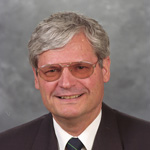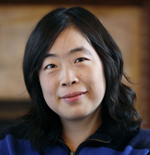David M. Holtzman, a leading expert in research to define the underlying mechanisms of Alzheimer’s disease, and Paul Michael Lützeler, an authority on 18th, 19th and 20th century German literature, will receive Washington University in St. Louis’ 2015 faculty achievement awards, Chancellor Mark S. Wrighton announced April 30.
Holtzman, the Andrew B. and Gretchen P. Jones Professor and head of the Department of Neurology at Washington University School of Medicine, will receive the Carl and Gerty Cori Faculty Achievement Award.
Lützeler, the Rosa May Distinguished University Professor in the Humanities and director of the Max Kade Center for Contemporary German Literature in the Department of Germanic Languages & Literatures in Arts & Sciences, will receive the Arthur Holly Compton Faculty Achievement Award.
Wrighton also announced that Lan Yang, PhD, the Edward H. and Florence G. Skinner Professor in the Department of Electrical & Systems Engineering in the School of Engineering & Applied Science, who has been recognized by President Barack Obama for her innovative research in nanophotonics, will receive the Chancellor’s Award for Innovation and Entrepreneurship.
The three will receive their awards and give presentations of their scholarly work Oct. 3 at Washington University.
“As distinguished scholars and as members of the Washington University faculty, professors Holtzman, Lützeler and Yang embody the ideals of individual and collaborative excellence,” Wrighton said. “All three have made significant contributions to their fields. All three have advanced the cause of interdisciplinary cooperation. I am extremely pleased to recognize their achievements with these awards.”
David M. Holtzman

Holtzman, a native St. Louisan, has made many important discoveries regarding how Alzheimer’s disease affects the brain. The condition is linked to a complex set of brain changes, including an increase in the amount of amyloid beta, a protein fragment that accumulates as plaques and has been linked to problems with memory and thinking.
Holtzman, who joined the faculty in 1994, has traced the twisted roots of these changes for years, hoping to identify treatments to slow or stop this disorder. For example, his research has shown how alterations in a gene called APOE, the major risk factor for Alzheimer’s, affect the brain; has identified a link between Alzheimer’s and sleep problems; and uncovered a connection between the activity of brain cells involved in daydreaming and the onset of the disease. His work also led to the identification of antibodies to amyloid beta and another Alzheimer’s protein called tau that are being developed as potential treatments.
Holtzman’s laboratory is internationally recognized for its efforts to identify biomarkers that can be used to detect the presence of Alzheimer’s many years before patients show outward signs of the disease. In the future, researchers hope to use these markers to begin treating patients before problems with memory become apparent.
Holtzman and former trainee and frequent research partner Randall Bateman, MD, were selected as 2014 co-winners of the Chancellor’s Award for Innovation and Entrepreneurship. They were cited for their work in developing a technique for monitoring production and clearance of amyloid beta in the brain and spinal fluid, and for founding a company to make the technique available to other researchers.
“I grew up in St. Louis, left after high school and never thought I’d end up coming back,” Holtzman said. “The last 20 years since I joined the faculty here have been amazing. There’s not a better place in the world to work on Alzheimer’s disease than Washington University. I think we’re not too far away from having treatments that make a difference.”
For his pioneering studies, Holtzman has been recognized with many prestigious honors in Alzheimer’s research, including the Potamkin Prize for Research in Picks, Alzheimer’s Disease and Related Disorders; the Zenith Award from the Alzheimer’s Association; and the MetLife Foundation Award for Medical Research in Alzheimer’s Disease. He also has been elected to the Institute of Medicine of the National Academy of Sciences.
Holtzman earned his medical degree from Northwestern University in 1985 and completed his neurology residency and postdoctoral research training at the University of California, San Francisco.
Paul Michael Lützeler

Lützeler, who joined the Washington University faculty in 1973, is an authority on the work of Austrian modernist and exiled writer Hermann Broch. He has written widely on 18th, 19th and 20th century German literature, with particular attention to the idea of Europe in German and European literature.
Other research interests include contemporary discourses in the humanities, such as postmodernism, postcolonialism, globalization; contemporary German literature; transatlantic cultural relations; German/Austrian-Jewish exile literature; and German and European Romanticism. In all, he is author of 14 books and editor of 35 volumes.
Born in Germany, Lützeler studied German and English literature, philosophy and history in Berlin, Edinburgh, Vienna and Munich. He emigrated to the United States in 1968 and four years later earned his doctorate from Indiana University.
Lützeler is editor of the Collected Works of Hermann Broch and author of “Hermann Broch. A Biography.” The latter appeared in German, English, Spanish and Japanese, and received the DAAD Prize of the German Studies Association. He was editor of “The German Quarterly” and serves on the boards of numerous scholarly journals and book series.
Lützeler founded the Max Kade Center, which supports collaboration among American students/scholars and German/Austrian/Swiss writers and critics, in 1984. The only center of its kind, its resources include the largest collection of contemporary German literature in the United States, which Lützeler built in collaboration with Olin Library. Activities include summer fellowships and “Gegenwartsliteratur,” a yearbook Lützeler founded in 2002.
A leader in transatlantic academic exchange, Lützeler established graduate student exchanges with four German universities and a faculty exchange with the University of Tübingen. In 1983, he founded Washington University’s European Studies Program, which he directed for two decades, and five years ago arranged the Volkswagen Foundation/Washington University post doc exchange in the Humanities.
Lützeler twice chaired Washington University’s faculty senate council and twice received the Distinguished Faculty Mentor Award. He sat on both the chancellor search committee in 1994-95; on the 21st century planning committee; and on Arts & Sciences’ curriculum and promotion and tenure committees. He has directed 50 dissertation committees in the German department.
Lützeler’s numerous honors include the German Cross of Merit 1st class; the Austrian Cross of Honor in Arts and Sciences 1st class; the Goethe Medal; the Humboldt-Forschungspreis; and grants from the John Simon Guggenheim Memorial Foundation and the American Council of Learned Societies, among others. He is a member of two German academies and president of both the International Hermann Broch Society and the American Friends of the German Literary Archive in Marbach.
Lützeler is an honorary member of the American Association of Teachers of German, which also bestowed on him the Outstanding Educator Award. His most recent books are “Tranatlantische Germanistik” (2013) and “Hermann Broch und die Moderne” (2011).
Lan Yang

Yang, who was installed as the Edward H. and Florence G. Skinner Professor in March 2015, heads the Laboratory of Micro/Nano Photonics Research Group in the engineering school.
Her research interests include fabrication, characterization and fundamental understanding of advanced nano/micro photonic devices with outstanding optical properties or novel features for unconventional control of light flow.
Her group focuses on the silicon-chip-based, ultra-high-quality micro-resonators and their applications. She and her team have demonstrated the first on-chip micro-resonator-based particle sensors that can achieve not only detection but also size measurement of single nanoparticles one by one.
Different materials also are used in her research to achieve advanced micro/nano photonic devices with desired properties, such as nonreciprocal light transmissions in a parity-time-symmetric optical resonator system, an all-optical analog of an electronic diode that allows current flow in one direction.
Most recently, Yang has published results of novel research in the loss-gain phenomenon. She and her team were able to provide new schemes and techniques to engineer a physical system by controlling loss. They took advantage of the loss to reverse the negative effect and produce lasing.
In 2010, she earned a National Science Foundation CAREER Award, and in 2011, she was honored by President Obama with a Presidential Early Career Award for Scientists and Engineers. The early career award is the highest honor given by the U.S. government to science and engineering professionals in the early stages of their independent research careers.
Yang joined the Washington University faculty in 2007. She earned a doctorate and a master’s degree from California Institute of Technology in 2005 and 2000, respectively; a master’s degree from the University of Science and Technology of China in 1999; and a bachelor’s degree from the University of Science and Technology of China in 1997.